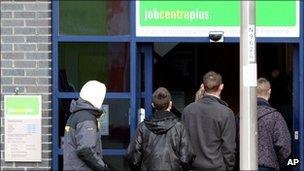Young jobless 'Neets' reach record level
- Published

General unemployment is also at a record level
The number of young people not in education, training or work has risen to a record level in England.
Official figures for the third quarter of this year say there were 1,163,000 people aged from 16 to 24 not in education, employment or training (Neet).
That is almost one in five of that age-group and an extra 137,000 compared with the same point last year.
The government says the number has been "too high for too long".
Last week, figures were published for UK unemployment, showing it had risen to a record level of 2.62 million in the three months to September.
Thursday's figures - for England - show about one in seven 16- to 18-year-olds - a total of 267,000 - are Neet.
That is 2,000 more than at this time last year.
The total number of Neets is at the highest level since records began in 2000 and the 137,000 increase is the biggest numerical rise ever recorded for this quarter.
The totals are published quarterly and the autumn figures are the peak of the year and drop back in winter, but overall the trend is up.
'Not complacent'
A government spokeswoman said: "The number of young people not in education, employment or training has been too high for too long - we are determined to bring the numbers down.
"We know that many young people move between school, college, university and work during the summer, which explains why Neet figures are higher during this quarter. But we will not be complacent and are taking action now to address this issue."
She added that young people's achievements at 16 were the most important influence on their future job prospects, and that the government aimed to boost this through its "ambitious school reforms".
"We are committed to raising the participation age, so that all 16- and 17-year-olds are in education or training by 2015 and we are reforming vocational education to ensure that there are high-quality opportunities for all young people to participate," she said.
The government says young people from poorer homes are more likely to become Neet and it hopes to improve their chances through its pupil premium policy, where schools get extra funding for children from low income homes.
Regional breakdown
Across England, there are big differences in terms of the growing number of young people becoming Neet.
The biggest year-on-year increase in numbers of 16- to 24-year olds who are not in work, training or education was in the north west of England, where 42,000 more young people were in that position in September compared with the same time last year, bringing the total to 204,000.
Yorks and Humber saw the next biggest increase - up 33,000 to 157,000.
In the West Midlands, numbers rose by 19,000 to 136,000.
The Association of Colleges says its latest survey shows there has been a 14% drop in young people signing up for Level One courses, which cover basic skills and pre-GCSE levels.
Martin Doel, the AoC's chief executive said: "These figures add weight to the results of our October survey of colleges and a new set of interim enrolment figures collected from colleges, both of which suggest that there has been a fall in the number of students leaving school with low levels of qualifications starting at college this year".
'Lost generation'
The employers organisation the Confederation of British Industry says the Neet figures are very worrying.
Katja Hall, CBI chief policy director, said: "It is alarming that there are so many 16 to 24-year-olds not in education, employment, or training, and today's figures show the vast scale of the problem we need to overcome to avoid a lost generation of young people.
"The CBI wants to see a 'Young Britain Credit' to give employers £1,500 for taking on an unemployed 16 to 24-year-old to get more young people into work. We also want the government to freeze the national minimum wage youth rate and to introduce a one-year apprenticeship scheme from January."
Nick Pearce, the director of the Institute for Public Policy Research said: "Today's rise in the number of young people not in employment, education or training is the biggest since records began in 2000.
"If reports are true, action to be announced tomorrow to support employers hire more young people and to expand youth apprenticeships are welcome.
"But the government should ensure that all young people who have been out of work for more than a year are guaranteed a job at the minimum wage to ensure they do not lose touch with the jobs market."
Last week the government launched a new element of its Apprenticeship Programme, including a £30m fund to support small firms take on trainees and measures it said would "reduce red tape for all employers providing apprenticeships".
It is understood the Deputy Prime Minister Nick Clegg will make an announcement about further action to tackle youth unemployment on Friday.
- Published16 November 2011
- Published16 November 2011
- Published4 November 2011
- Published24 August 2011
- Published23 August 2011